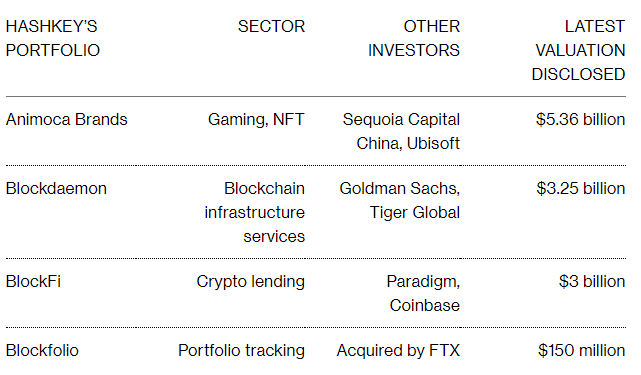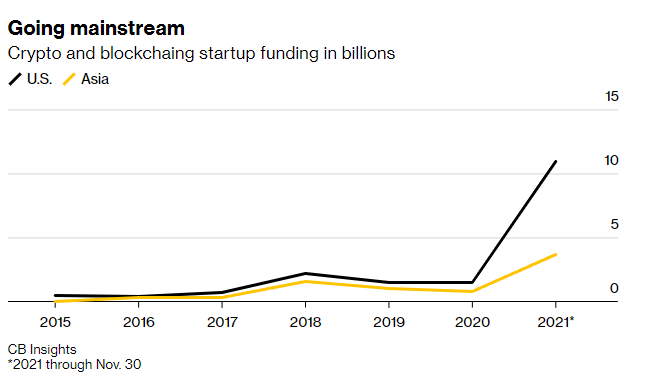HashKey will establish a $600 million venture capital fund, aiming to become the largest crypto investment fund in Asia
Original Title: 《An Early Ethereum Backer Is Targeting Asia's Biggest Crypto Venture Fund》
Original Source: Bloomberg
Original Translation: 0x13, Rhythm
In 2015, when Vitalik Buterin was raising funds for the Ethereum he created, he came to Shanghai to meet a group of Chinese crypto enthusiasts.
Among them was Deng Chao, who was then an investment manager at Wanxiang Group in China. He was impressed by the 21-year-old Vitalik Buterin's ability to write code while answering complex questions. He convinced his boss to invest about $500,000 in ETH at the time.

At that time, it seemed like a gamble. ETH was priced at just $1, and now it has risen to $2,300. Ethereum has now become the second-largest blockchain network, and this time, the one in need of funding is Deng Chao. Now 39, he is the investment director at HashKey, which was spun off from Wanxiang, and the company has raised $360 million for its third venture fund. Deng Chao stated in an interview that this fund aims to raise $600 million, which would set a new record in Asia.
Deng Chao chose to double down during a time of crisis in the crypto market. After a year of soaring BTC, ETH, and a range of other cryptocurrencies that set records, expectations of tightening monetary policy led to a liquidation. ETH has dropped about 50% from its peak in November.
The venture capital industry invested more in crypto companies in 2021 than in all previous years combined, and at the start of 2022, there were quite a few funding rounds with valuations in the billions. However, after the tech stocks and digital currencies plummeted in January, some venture capitalists became cautious.

Deng Chao, however, remains calm about the current market turmoil.
"The crypto market generates new bubbles from time to time, but as a new technology, it has clearly become a trend, and it is maturing," he said in an interview. "The market cooling is actually a good time for treasure hunting."
HashKey's parent company Wanxiang and Vitalik Buterin—now the chief scientist of this Chinese company's blockchain division—may help facilitate transactions.
As institutional interest and participation in the crypto space increase, HashKey is betting on startups that provide cryptocurrency services to financial companies. Among the most important is Blockdaemon, which hosts the computer nodes that make up blockchain networks for clients like JPMorgan and Citigroup.
On Thursday, the U.S.-based company announced that it raised $207 million from investors including SoftBank's Vision Fund 2 and Tiger Global, more than doubling its valuation to $3.25 billion in four months. HashKey invested in Blockdaemon in May 2020 when it had only 16 employees and attracted clients through a single website.
Founder Konstantin Richter was then looking for investors who could help him expand into Asia, preferably a company that spanned both crypto and traditional finance. According to those familiar with the matter, the round in which HashKey participated valued Blockdaemon at about $30 million. HashKey's spokesperson and Richter declined to comment. Since then, Blockdaemon has built an Asia team, including recently hiring a former Amazon Web Services executive to lead sales in the region.
"It all started with HashKey's investment," Richter told Bloomberg.

HashKey has also invested in a range of Ethereum-based projects, including digital wallet maker imToken and crypto application Mask Network, as well as Polkadot and some of the most commonly used applications running on it. According to a spokesperson, HashKey's first two funds have raised a total of $100 million and have brought about 11 times the returns for their clients' capital.
"Since 2015, we have been interacting extensively with the developer community, especially in Ethereum," Deng Chao said. "Our network is a powerful asset."
A HashKey spokesperson said that the investors in the third fund include major institutional investors, corporations, venture firms, and family offices, but he declined to disclose their identities due to confidentiality agreements.
Deng Chao stated that equity investments now account for about 20% of HashKey's capital allocation, with the rest going into cryptocurrencies. However, he expects this proportion to rise in the latest fund as more crypto startups attempt to develop services for traditional industries.
The new fund will not make significant investments in China. Since Deng Chao met Vitalik Buterin in Shanghai in 2015, the Chinese government's stance on crypto has become increasingly stringent. Last year, authorities effectively banned most of the industry, declaring Bitcoin mining and cryptocurrency trading illegal, marking the peak of policy tightening.
HashKey is headquartered in Hong Kong, allowing them to operate in a more tolerant environment. The parent company Wanxiang still runs a non-profit organization in Shanghai that supports blockchain technology without the accompanying free-trading, untraceable currencies. China actually supports blockchain technology, provided it is not used for trading speculative tokens.
If successful, HashKey's third fund would be substantial in Asia, but it pales in comparison to some funds in the U.S. In November, San Francisco-based Paradigm launched a $2.5 billion cryptocurrency fund, surpassing the $2.2 billion fund raised by a16z a few months earlier.
The influx of venture capital has also faced criticism. Among them is former Twitter CEO Jack Dorsey, who last year denied the involvement of venture firms in a space he believes should not be controlled by centralized entities.
But Deng Chao believes that investors can serve as a bridge between crypto believers and traditional financiers and regulators. He said, "Venture capital firms should play a different role in the Web3 era."











